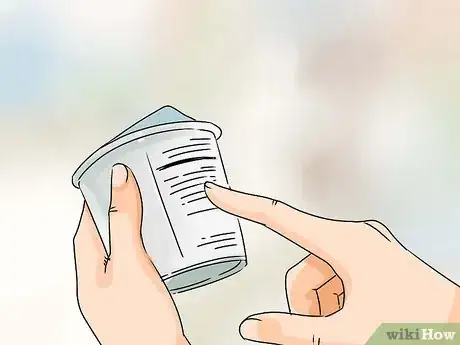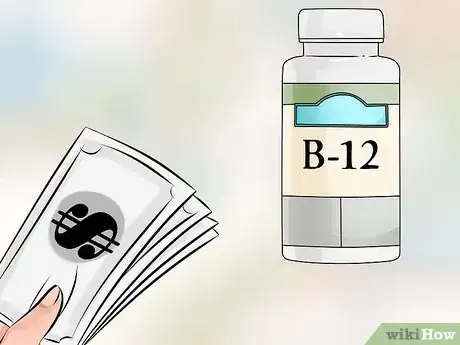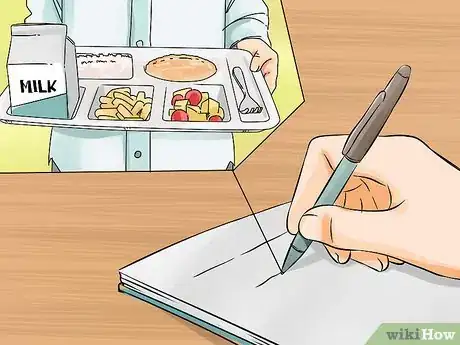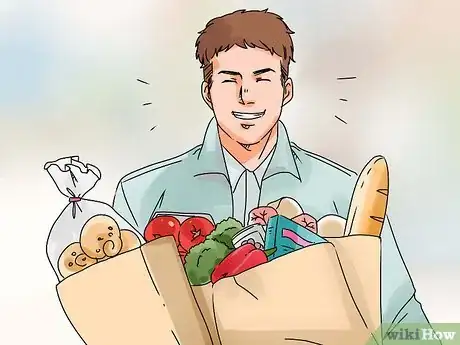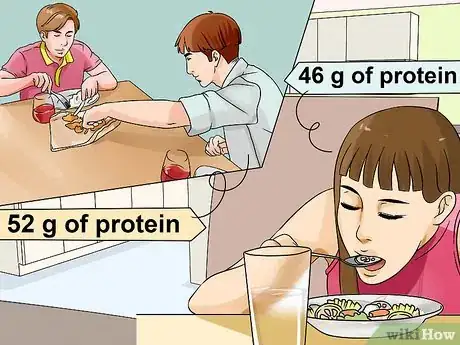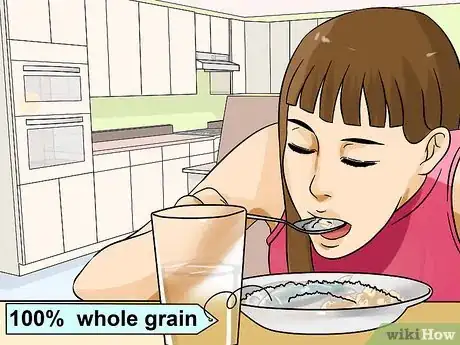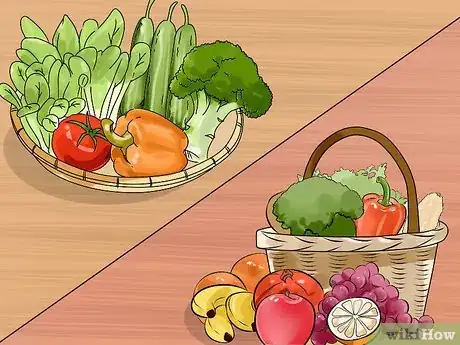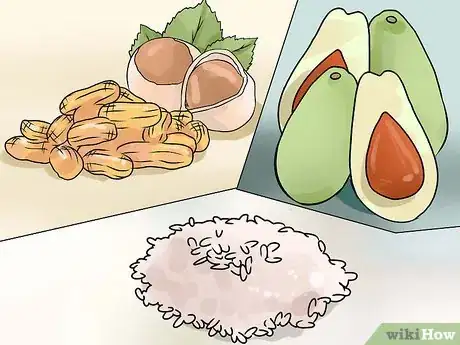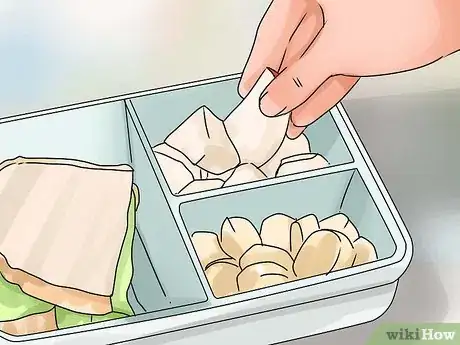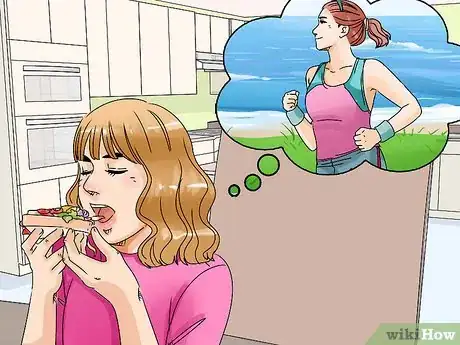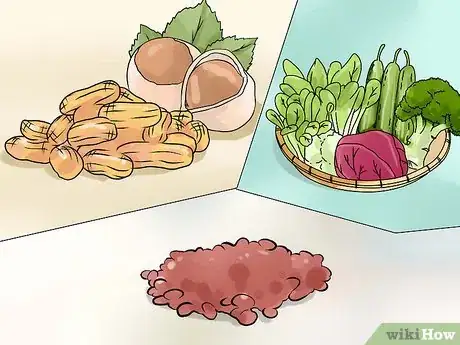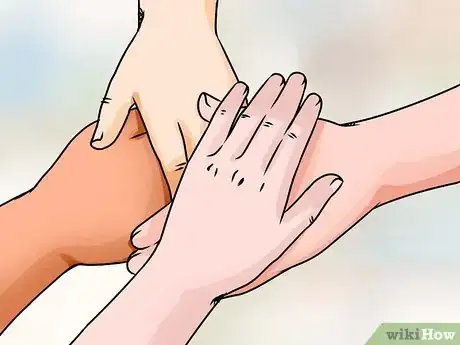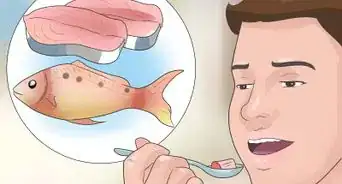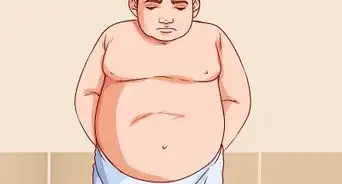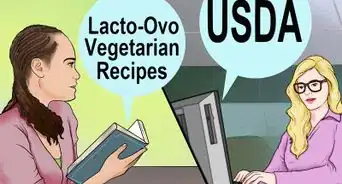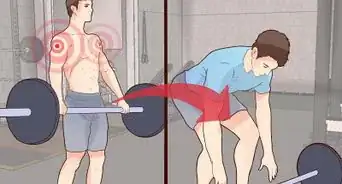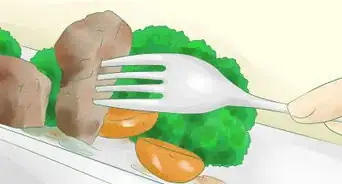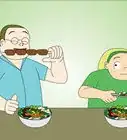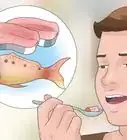This article was co-authored by Claudia Carberry, RD, MS. Claudia Carberry is a Registered Dietitian specializing in kidney transplants and counseling patients for weight loss at the University of Arkansas for Medical Sciences. She is a member of the Arkansas Academy of Nutrition and Dietetics. Claudia received her MS in Nutrition from the University of Tennessee Knoxville in 2010.
There are 12 references cited in this article, which can be found at the bottom of the page.
wikiHow marks an article as reader-approved once it receives enough positive feedback. In this case, 87% of readers who voted found the article helpful, earning it our reader-approved status.
This article has been viewed 117,815 times.
Veganism is a diet and lifestyle that about one million Americans and other people all over the world follow.[1] Vegans do not use or consume any animals or animal-derived products. This includes not consuming honey and not purchasing or wearing clothing made from leather, wool, silk or fur.[2] Transitioning to a vegan diet/lifestyle can be challenging for any age, but even more so for teenagers. Ensuring you eat a variety of foods in the right amounts and being aware of how to maintain a balanced vegan diet will be important to your success.
Steps
Transitioning to a Vegan Diet
-
1Talk to your parents and family. It's important to speak to your parents or family members about your desire to adopt a vegan diet and lifestyle. They might be interested in why you want to become a vegan in addition to possibly being worried about your overall health and wellness.
- Your parents or family might be somewhat unfamiliar with a vegan diet. It's commonly thought that it's difficult to eat enough protein or enough nutrients when following a vegan diet. You can see how this may worry your parents.
- Prior to bringing up the subject with your parents, spend some time researching veganism, the restrictions involved, foods you'll be able to eat, and how you think you'll be able to incorporate this eating pattern and lifestyle into your life.
- Present your argument for becoming a vegan to your parents in a calm, considerate tone. Share with them the reasons you feel it's important for you to become a vegan. Present any research or resources you've found to share with them.
- Consider transitioning to veganism in stages. Try first cutting back on meat, then moving to a vegetarian diet, then becoming vegan.
- It's also very important to listen to your parents' or family's concerns. Be open-minded and truly consider what they have to say. They have your best interests at heart.
- Show your parents a vegan cookbook or offer to cook everyone dinner one night.
- You can also show them a mock meal plan you've developed. Enter the meal plan into an app that tracks nutrients to prove you're eating a healthy and complete diet.
-
2Read all labels. Become familiar with all food labels, especially in regards to processed or pre-made foods. Some items may look vegan when in reality they're not. For example, a vinaigrette that contains honey. Read over the ingredient label to make sure there are no animal products in your foods.
- For example, many baked goods are made with eggs and milk which are not included on a vegan diet. Other foods that may not be vegan are salad dressings or sauces.
- Choose pre-made foods that specifically say "vegan" on their label. This will help make it easier to choose different items.
- Also pay attention to labels for cosmetics, soaps, and other toiletries. Some companies still test their products on animals; vegans will not use these types of products.
Advertisement -
3Purchase vitamin and mineral supplements. Vegan diets can be a very healthy way of eating; however, vegan diets are not necessarily 100% complete in terms of the necessary vitamins and minerals you need. This is especially important for teenagers as you're still growing and developing; however, with adequate planning and a few vitamin or mineral supplements veganism for teens is an appropriate and healthy way of eating.
- One nutrient, in particular, is Vitamin B12. Without supplementation, a vegan diet contains little to no vitamin B12. This vitamin is typically found in animal products (like poultry, red meat or dairy items). A vegan diet completely removes all animal products and therefore has a high risk of not consuming adequate amounts of vitamin B12 which can lead to a deficiency. Choose to take a B12 supplement or choose foods like fortified vegan milks, meat substitutes or cereals that have adequate B12.
- Other nutrients to be aware of are calcium and Vitamin D. Both of these nutrients are essential for healthy bones and bone growth (much of which is occurring during adolescence.)[3] Choose items like fortified juices or vegan milks, dark leafy greens, almonds, and tofu.
- Vitamin and mineral supplements are not meant to replace foods. Consume a balanced, nutritious diet and aim to meet 100% of your daily nutrient needs through foods. Supplements are just a "back up" to your diet.
Preparing Vegan Meals
-
1Write up a meal plan. Writing out a weekly meal plan can help you make sure you're consuming a well-balanced diet. Again, vegan diets are more restrictive compared to a non-vegan diet and a little more thought needs to go into your weekly meals and snacks.
- Take an hour or two of your free time and write up your ideas for all meals and snacks. Share your ideas with your family, especially if you're not the one going grocery shopping or preparing the meals at home.
- Write up a list of your favorite vegan meals (or mostly vegan meals) that you or your family already consume. This might not only help your family, but can make the transition easier if you're already familiar with a few tasty meals that are vegan. You can rely on these as you learn new recipes and tips.
- If you're busy or on the go, plan for meals that are quick, or keep a shelf-stable vegan snack with you.
- Take it slowly! This is the most important thing to remember. Very few people can make the change from omnivore (or even vegetarian) to vegan overnight. Try eating vegan for one meal out of the day, and then two, and finally three.
-
2Ask your parents to make you an appointment with a doctor or dietitian. Take your meal plan to your appointment for review. They can ensure you are getting everything you need nutritionally, give you ideas for meals, and make sure you stay healthy and thrive while living a vegan lifestyle.
- Ask them: "Am I accounting for all three meals, plus snacks?"; "Am I consuming enough calories at each meal?"; "Is my diet nutritionally adequate?"
- Quick and easy-to-prepare meals include: 100% whole wheat spaghetti with tomato sauce, broccoli and vegan meatballs; vegan quesadillas with vegan cheese, grilled vegetables, and black beans or a spinach salad with pan-fried tofu, vegetables, and your favorite salad dressing.
-
3Go grocery shopping. Going to the market and stocking up on some essential vegan items will be important. Having items that will fit into your diet on hand will make it much easier to prepare and eat vegan meals.
- Talk to your parents — especially if they are the ones that are going to the grocery store and paying for the majority of the food in your household. Ask to tag along and add a few vegan items to the cart.
- Remember, you don't need a whole bunch of new or specialty items. You and your family might already have a fair amount of vegan items on hand at home. Items like fruits, vegetables, whole grains, beans, and nuts are all items that will fit well into a vegan diet.
- If you or your family has a fairly well-stocked kitchen, focus on purchasing alternate protein sources instead. Items like vegan cheese, tofu, tempeh, or meat substitutes are great sources of protein.
-
4Consume adequate protein. One concern many people have with vegetarian or vegan diets is the ability to consume adequate protein. With a well-planned and well-balanced diet, vegans (even teenagers) should have no problem consuming adequate protein.
- Teenage boys generally need to consume around 52 g of protein daily and teenage girls need to consume around 46 g of protein daily.[4]
- Choose a variety of protein sources throughout the day. Each different protein will offer different valuable nutrients.
- Vegan proteins to try or to incorporate into your diet include tofu, tempeh, seitan, beans, lentils, nuts, vegan cheese/yogurt, and nut-based or soy milks.
- Also give meat analogues or substitutes a try. If you try these items ensure that they are 100% vegan. They are made to taste somewhat and look like typical meat products. For example, there are "deli meats" and "bacon" that are 100% vegan.
-
5Eat 100% whole grains each day. Whole grains contain all 3 parts of the grain: the germ, endosperm, and bran. All 3 parts offer various nutrients to your body. Fiber, nutrients and even protein are key nutrients found in 100% whole grains.[5] For vegans, whole grains can offer a valuable source of protein.
- Whole grain foods include oats, brown rice, quinoa, 100% whole wheat pasta, corn, farro, millet, or barley.
- Try to minimize refined or processed grains. These types of grains have been stripped of all their nutritional value. Items like these are considered refined grains: white bread, white rice, and plain pasta.
-
6Fill up your meals with fruits and vegetables. These naturally vegan foods are a great source of vitamins, minerals, and fiber. It's recommended to make 50% of all your meals a fruit or a vegetable.
- Choose a variety of fruits and vegetables each day and week. Having a large variety of these foods will help you consume a wider range of nutrients.
-
7Eat plant sources of healthy fats. Omega-3 fats are healthy fats that are commonly found in some animal products. They should be included in a vegan diet from other sources.
- Vegan sources of healthy fats include: avocado, flaxseed, walnuts, tofu, soybeans, and walnuts.[6]
- Try to incorporate a healthy fat at least one to two times per day.
Accounting for Lifestyle Factors
-
1Pack your lunch and snacks. When transitioning to a vegan diet as a teenager, you have to take your lifestyle into consideration. Think about your school schedule, extracurricular activities, sports, and other events.
- Packing your lunch might be a necessary option. Many school cafeterias don't offer vegetarian or vegan meals. Packing your lunch each day may help make sure you have a good, nutritious meal that you'll enjoy and fits your vegan lifestyle.
- Vegan packed lunch options could include: Sliced veggies, hummus, and avocado on vegan pita bread; whole-wheat pasta tossed with broccoli, black olives, vegan meatballs, and tomato sauce; or vegan whole wheat bread with vegan cheese and vegan deli meat and 1 cup raw carrots.
- Packing vegan snacks can also make life a little easier - especially if you have after school activities. Vegan snacks can include soy yogurt and fruit; apple with peanut butter; or 1/3 cup of trail mix.
- It might also be smart to carry around dried or fresh fruit for a quick snack. They're great for a quick needed meal or snack.
-
2Eat enough protein and carbs for active lifestyles or sports. Teenage athletes need a little more protein and carbohydrates than teens who are not participating in sports or other athletics. Consuming protein and complex carbs at every meal and snack can help make sure you consume your required daily amount.
- Athletes participating in endurance sports require 0.5 – 0.8 g per pound per day of protein.[7] Moderate to heavy training requires 3 to 4.5 grams of carbohydrates per pound. Your doctor or dietitian can help you ensure you are meeting these amounts.
- Carbohydrates are the most important fuel — and are the only fuel that can be used for power moves.[8]
- It might also be a good idea to have a snack before and after a sports game, practice or athletic event so you can fuel and recover better.[9]
-
3Consume adequate iron daily. Teenagers need to ensure they're consuming adequate iron daily. This is especially true for teenage girls and if they are menstruating.
- Ideally, aim for at least 15 mg iron daily for teenage girls.[10] Teenage boys need around 11 mg of iron daily.[11]
- Vegan foods that are high in iron include beans, dark greens, tofu, and some nuts. Consuming iron-rich foods with vitamin C rich food (like citrus fruit or OJ) can help increase the absorption of iron. [12]
- Taking a daily multivitamin/multimineral can also help you meet the daily recommendations for iron in addition to a variety of other nutrients.
- If you are feeling fatigued all the time, it is likely that you are deficient in iron or another vitamin. Ask your primary care provider for blood work to ensure you are not lacking a necessary nutrient.
Building a Support System
-
1Recognize support is important. A support group can not only help you answer questions as you transition to a vegan diet. It also can serve as emotional support and encouragement. The teen years are ones where most people are sensitive to wanting to fit in with their peers. Teasing or negative reactions to going vegan can be really upsetting. It’s important to have a support group, especially if your friends and family aren’t vegan.
-
2Connect on social media. Social media is convenient because it can provide support anywhere, anytime.
- Join Facebook groups for vegan teens.
- Join regular Facebook vegan groups and seek out other vegan teenagers there.
- Follow vegan teenagers on YouTube and Instagram.
- Join the vegan subreddit on Reddit.
- See if vegan clubs at colleges and universities you attend (or plan on applying to) have social media sites you can follow or join.
-
3Connect in your community. Interacting face to face with supportive people can make your vegan journey much better than going it alone. Your community may have vegan and almost-vegan teenagers and vegan adults who would be happy to provide you with support and encouragement. Some vegan teens who feel alone may be surprised to learn how many people similar to themselves are already in their community.
- Start a vegan and vegetarian club at school. Many vegetarians care about animals and would appreciate additional tips and education about vegan options.
- See if a vegan Meetup.com group exists in your area.
- Contact Vegan Outreach's Vegan Mentor Program. Vegan Outreach encourages people of all ages to sign up either to be a mentor or get a mentor. However, if you are between the ages of 13 and 17, they require a short email from one of your parents giving permission and stating your name and age. [13]
- See if your local university or college has a vegan student group. (Even if you’re not already in college, some may welcome you to attend meetings.)
- If negative reactions to your choice to go vegan is causing you distress that interferes with your life, consider calling local therapists to ask if they’re vegan-friendly and treat teenagers.
-
4Connect outside your community. Several options exist for connecting with supportive fellow vegans outside your community.
- Attend a vegan summer camp.
- Ask vegan animal advocacy organizations about internships. Don’t wait for official internship postings before reaching out to inquire about internship opportunities. Unless you are lucky enough to live in a city where an advocacy organization is located, you may need to do an internship remotely or travel. For summer internships, for example, some teens may stay temporarily with family or other trusted adults.
- Call the Animal Activist Hotline if needed. They provide supportive telephone and e-counseling, contacts for local and national activist resources, and referrals for psychotherapists who are sensitive to activists’ concerns. (For activists in the United States and Canada: (800) 705-0425 or by email at helpline@idausa.org).
-
5Don’t give up. The only thing vegans have in common is their vegan lifestyle. Vegans have different personalities. Some are warm and supportive, whereas others are cold and critical. Don’t let unkind comments or criticism from anyone—including other vegans—get you down. Many vegans would love to support and encourage you in your vegan journey. Don’t give up until you find them!
Warnings
- Make sure you are getting all of your vitamins! Talk to a doctor and your parents before taking supplements. Ask about a multivitamin or supplements such as B-12 or iron.⧼thumbs_response⧽
- Always consult with your physician prior to making any large changes to your diet.⧼thumbs_response⧽
- Many foods that are vegan are not actually good for you. Just because a food doesn’t contain animal products, does not mean that it is automatically healthy. For example, potato chips, Airheads, Sour Patch Kids, Oreos, Hershey's syrup, etc. are all vegan.[14]⧼thumbs_response⧽
References
- ↑ http://www.vegetariantimes.com/article/vegetarianism-in-america/
- ↑ http://www.vrg.org/nutshell/vegan_nutshell.pdf
- ↑ http://www.vrg.org/nutrition/VeganNutritionForTeenagers.pdf
- ↑ http://www.webmd.com/food-recipes/protein
- ↑ http://wholegrainscouncil.org/whole-grains-101
- ↑ http://www.vrg.org/nutshell/vegan_nutshell.pdf
- ↑ http://www.eatright.org/resource/fitness/sports-and-performance/fueling-your-workout/how-teen-athletes-can-build-muscles-with-protein
- ↑ http://www.eatright.org/resource/fitness/sports-and-performance/fueling-your-workout/teen-nutrition-for-fall-sports
- ↑ http://www.prevention.com/food/healthy-eating-tips/20-perfect-workout-snacks
About This Article
In order to be a vegan teenager, it’s important to make sure you are getting enough vitamins and minerals. Boys need around 52 grams of protein a day and girls need around 46 grams, so eat plenty of vegan proteins like tofu, beans, lentils, and seitan. In addition to protein-rich foods, eat 100% whole grain foods including brown rice and quinoa while avoiding refined grains that have no nutritional value, like white bread. To round out your diet, include healthy fats from foods like avocados or walnuts at least one to two times a day. While a vegan diet can be healthy, it’s not complete, so consider taking supplements to get enough calcium and Vitamins B12 and D. For more help form our Dietician co-author, like how to build a support group, scroll down!

